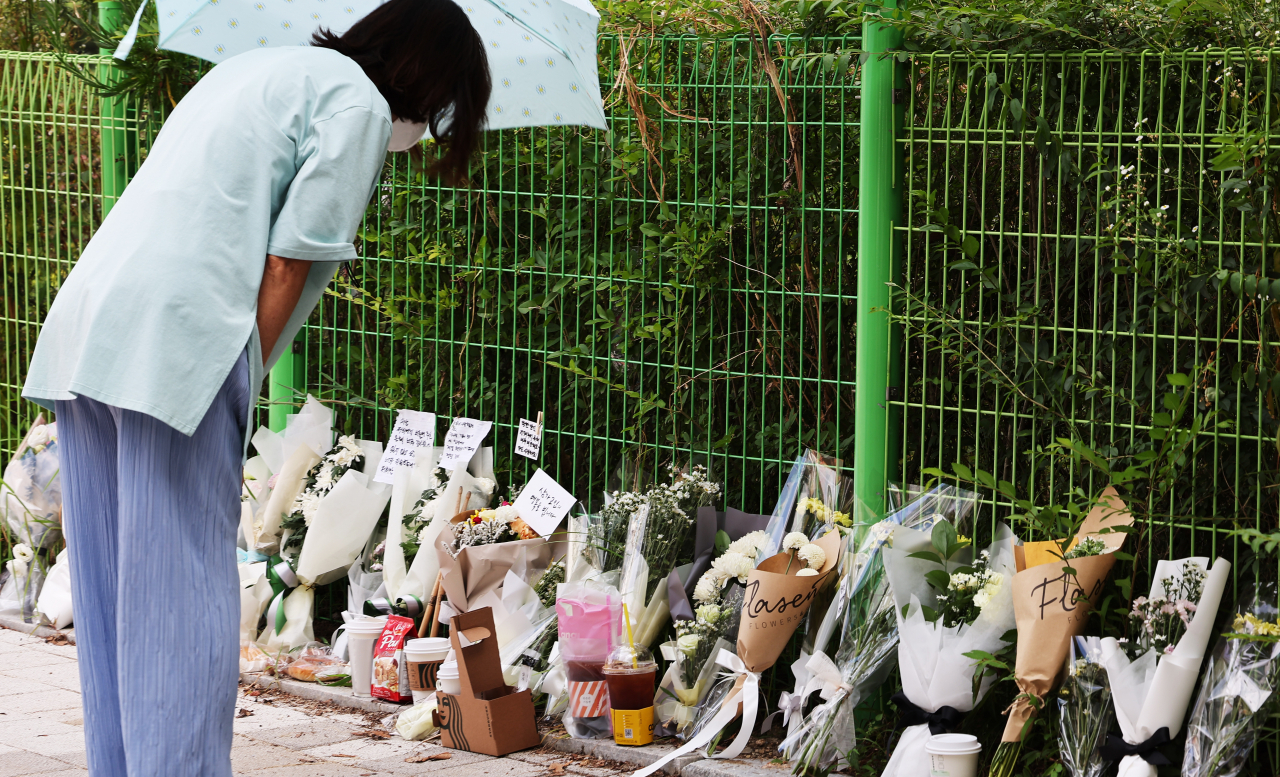As violent crimes surge, Korea mulls life sentences without parole
By Son Ji-hyoungPublished : Aug. 22, 2023 - 17:51

As a series of violent crimes targeting random people stokes public fears in South Korea, the government is mulling introducing a new form of life sentence -- one without the possibility of parole.
The announcement claimed that the introduction was necessary to have a safe society and quell public fears about the growing threat of apparently motiveless crimes.
A stabbing spree by a 33-year-old man in July killed one and injured three in broad daylight in southern Seoul.
This was followed by a frenzied attack in August by a 22-year-old, who rammed his mother's car into a department store in wealthy Bundang district in Gyeonggi Province and stabbed nearby pedestrians during the evening rush hour. The rampage killed one and injured 13 -- one of whom is still in critical condition.
Police have been mustering available resources for special policing measures. Officers arrested 20 people out of 173 people detained over two weeks until Friday for posting online death threats -- out of some 300 people in total.
But Thursday's rape and murder of a woman by a 30-year-old surnamed Choi -- believed to be a stranger to the victim -- has fanned public fears again.
This has driven the government's move over the past week to give the court the power to rule out parole when giving life sentences.
On Thursday, the government announced plans at a pan-governmental meeting to address the surge in violent crime, including harsher sentencing, more police patrols and increased access to mental health care. It also plans to send more people with mental illness into compulsory custody in psychiatric wards if they pose a danger to others.
Notably, the government is looking to introduce the possibility of a life sentence without parole by revising the Criminal Act. The revision will be proposed by the Ministry of Justice, which has been gathering public opinion for about a month through an administrative notice starting Aug. 14.

Prime Minister Han Duck-soo claimed the introduction of life sentences without parole would enhance deterrence of serious crimes. President Yoon Suk Yeol on Monday also ordered Han in their regular weekly meeting to come up with "fundamental measures" to stem motiveless crimes.
"A series of so-called 'senseless crimes' targeting strangers in bustling districts in major cities ... are disrupting common sense and causing a breakdown of social order," Han said in a speech. "The government is taking the incidents seriously."
Searching for alternatives
Korea has yet to formally abolish capital punishment, but no execution has taken place since December 1997. Although this means the death sentence is effectively life without parole, courts have generally avoided it, leaving life sentences as the de facto harshest punishment as of current.
Justice Minister Han Dong-hoon in a parliamentary questioning in July ruled out the possibility of resuming capital punishment, saying the decision could jeopardize Korea's diplomatic ties with the European countries, despite calls by a bereaved family member of a stabbing rampage victim in southern Seoul to do so.
Under the Korean rules, prisoners on a life sentence are eligible to seek parole after serving 20 years. Other than life imprisonment, the maximum prison term is 50 years, if aggravating factors are involved.
From 2015 to 2022, 199 lifers were released on parole, according to the Justice Ministry. As of 2022, there were 1,313 prisoners serving life sentences, accounting for nearly 4 percent of Korea's prison population.
According to police data compiled by the Supreme Prosecutors' Office, reports of serious violent crimes -- homicide, robbery, arson and rape -- surged from 33,787 in 2013 to 44,205 last year.
From 2013 until 2018, according to Justice Ministry's 2023 data, 3,801 prisoners who committed violent crimes of homicide, robbery and sexual murder were released on parole, and nearly 6 percent of them were convicted and served prison terms again within the next three years.

A January 2022 high court ruling on Kim Tae-hyun, a man convicted of murdering a woman whom he stalked, as well as her sister and her mother at their house, suggested Kim deserved a life sentence without a possibility of parole given the gravity of his crime "that left ordinary Koreans panicked and enraged." But the option did not exist at the time. A later Supreme Court ruling in April 2022 did not explicitly support the lower court's suggestion.
The government has not clarified either the type or the gravity of crimes that could be subject to life without parole sentence. It also did not elaborate on whether life without parole could be applied retrospectively.
But the Justice Ministry openly stated that its policy supporting harsh sentences is inspired by the United States, which has institutionalized life without parole.
Ineffective in fighting crime?
Experts based in the United States, however, claimed that the introduction of life without parole might be ineffective.
Mark Osler, professor of law at University of St. Thomas in Minnesota, said that deterrence would require that someone perform a rational analysis to factor in the chance of getting a harsh sentence, hence harsh sentencing cannot solve this issue on its own.
"People who commit violent crimes are not the kind of people who do that kind of analysis, so deterrence doesn't work," said Osler.
"The key is to solve more crimes, not long sentences. The certainty of getting caught steers people away more often than lengthy terms."
Experts also noted that, given the declining propensity to commit violent crimes as people enter their 50s and 60s, the growing medical needs of inmates as they age, and the need to regulate prison populations, introducing life without parole might not be cost-effective.
Osler said that a shorter sentence, including life sentence with chances of being released later on, can effectively incapacitate someone because they eventually "age out of crime."

Ross Kleinstuber, associate professor of justice administration & criminology at the University of Pittsburgh at Johnstown, echoed this view, saying the life sentence without possibility of parole is an "ineffective means of fighting crime."
"As humans age, they tend to have more medical needs, so these older people are far more expensive to incarcerate even though they are less of a threat to society," said Kleinstuber.
He added the whole-life prison term "raises serious human rights concerns."
In 2013, the European Court of Human Rights declared life sentences without parole to be a violation of human rights. This led to the abolition of life-without-parole sentences in the Netherlands in 2016, Lithuania in 2017 and Ukraine in 2019.
Latin American nations also view life without parole to be a violation of the American Convention on Human Rights and thus do not use it as a sentencing option.
But life without parole is found in a number of European countries, including Bulgaria, Sweden, and England and Wales.
Moreover, there are still instances where countries are moving to introduce life without parole. In 2019, Serbia introduced life sentences without parole for crimes such as the rape and killing of a minor or a pregnant or disabled person, after a father of a murdered daughter -- a minor when abducted and killed -- launched a campaign calling for the introduction of harsher sentence. Poland followed suit in 2022.
"There have been renewed calls in many European nations to bring back life without parole and capital punishment, so the issue is far from settled," Kleinstuber said.



















